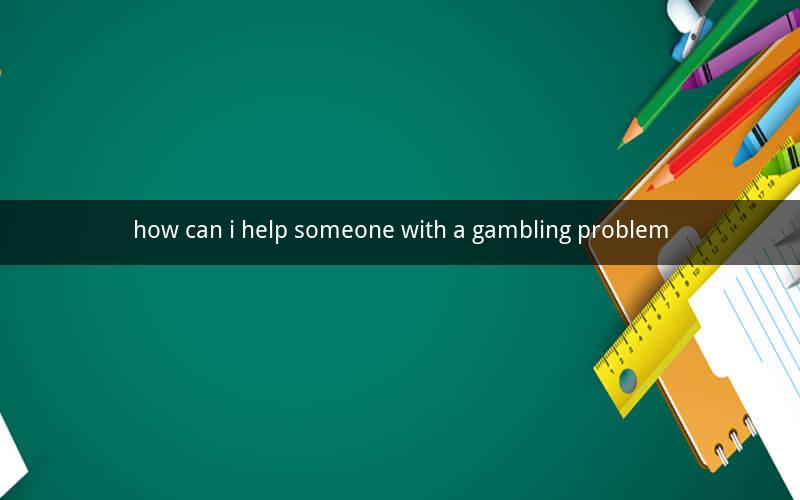
Table of Contents
1. Understanding the Problem
2. Open Communication
3. Encourage Professional Help
4. Set Boundaries
5. Support Groups
6. Financial Support
7. Monitor Progress
8. Be Patient and Understanding
9. Personal Care
10. Legal and Ethical Considerations
1. Understanding the Problem
Recognizing the signs of a gambling problem is the first step in helping someone. Look for indicators such as secretive behavior, financial strain, and neglect of responsibilities. It's essential to approach the situation with empathy and non-judgment.
1. Open Communication
Create a safe and supportive environment where the person feels comfortable discussing their struggles. Listen actively, show empathy, and avoid lectures or confrontations. Encourage them to share their feelings and experiences without fear of judgment.
1. Encourage Professional Help
Suggest seeking professional help from a therapist or counselor specializing in gambling addiction. They can provide personalized treatment options and support tailored to the individual's needs. Professional help can also offer strategies for coping with cravings and relapse prevention.
1. Set Boundaries
Establish clear boundaries to protect yourself from enabling behaviors. This may include limiting access to funds or restricting visits to gambling establishments. It's crucial to prioritize your well-being and maintain healthy relationships.
1. Support Groups
Encourage the person to join support groups such as Gamblers Anonymous or other community-based organizations. These groups offer a sense of community, understanding, and shared experiences. Members can share coping strategies and offer mutual support.
1. Financial Support
Offer financial assistance if necessary, but do so with the understanding that it may not be a long-term solution. Encourage the person to seek financial counseling or consider alternative ways to manage their debts.
1. Monitor Progress
Stay engaged in the person's recovery journey. Regularly check in on their progress, celebrate milestones, and offer encouragement. Monitoring can help identify potential triggers or setbacks and provide an opportunity to offer additional support.
1. Be Patient and Understanding
Recovery from a gambling addiction is a gradual process that requires patience and understanding. Avoid expecting immediate results or becoming frustrated. Celebrate small victories and acknowledge the challenges faced along the way.
1. Personal Care
Take care of yourself during this process. Seeking support from friends, family, or professionals can help you cope with the emotional and mental stress. Remember that you are not responsible for the person's addiction but can offer support and guidance.
1. Legal and Ethical Considerations
Be aware of legal and ethical considerations when helping someone with a gambling problem. This may include discussing the situation with family members or law enforcement if necessary. Ensure that your actions align with the best interests of the individual and prioritize their well-being.
Frequently Asked Questions
1. What are the signs of a gambling problem?
- Signs include secretive behavior, financial strain, neglect of responsibilities, and a preoccupation with gambling.
2. How can I encourage someone to seek professional help?
- Offer empathy, non-judgment, and a listening ear. Suggest seeking help from a therapist or counselor specializing in gambling addiction.
3. What if the person is unwilling to seek help?
- Be patient and persistent. Continue offering support and resources, but avoid enabling behaviors that may hinder their recovery.
4. How can I set boundaries without causing harm?
- Communicate your concerns and needs clearly. Establish boundaries that prioritize the person's well-being and your own.
5. Are there support groups available for family members of someone with a gambling problem?
- Yes, there are support groups like Gam-Anon for family members and loved ones affected by a gambling addiction.
6. How can I provide financial support without enabling?
- Offer assistance as a short-term solution while encouraging the person to seek financial counseling or explore other options for managing their debts.
7. What should I do if the person relapses?
- Offer support, empathy, and encouragement. Help them identify triggers and develop strategies for coping with cravings.
8. How can I maintain my own emotional well-being during this process?
- Seek support from friends, family, or professionals. Engage in self-care activities and prioritize your mental and emotional health.
9. Are there legal implications for helping someone with a gambling problem?
- Generally, there are no legal implications for helping someone with a gambling problem. However, it's essential to be aware of potential legal issues, such as financial fraud or embezzlement, and address them appropriately.
10. How can I ensure that my actions align with the best interests of the individual?
- Prioritize the person's well-being, offer support, and encourage them to seek professional help. Be patient and understanding throughout the process.